TORT LAW: Should New South Wales Enact Zoe's Law? A Legal Analysis
VerifiedAdded on 2022/09/17
|9
|2554
|23
Essay
AI Summary
This essay provides a thorough examination of the Crimes Amendment (Zoe's Law) Bill 2013 (No 2) proposed in New South Wales, Australia. The essay delves into the bill's purpose: to provide legal status and protection to a fetus of 20 weeks or older, allowing for redress under criminal law in cases of grievous bodily harm. It explores the historical context of the bill, including the case of Zoe, whose name was adopted for the law. The essay examines the arguments of both supporters and opponents of the bill, including concerns about women's reproductive rights, the legal status of abortion, and potential conflicts between the rights of the fetus and the mother. It also discusses the impact of the bill on various religious views and the potential for increased criminal accountability related to maternal choices. The essay concludes with a balanced assessment, considering the positive aspects of recognizing fetal rights alongside the potential negative impacts on women's autonomy and human rights, and the need for careful consideration before enactment.
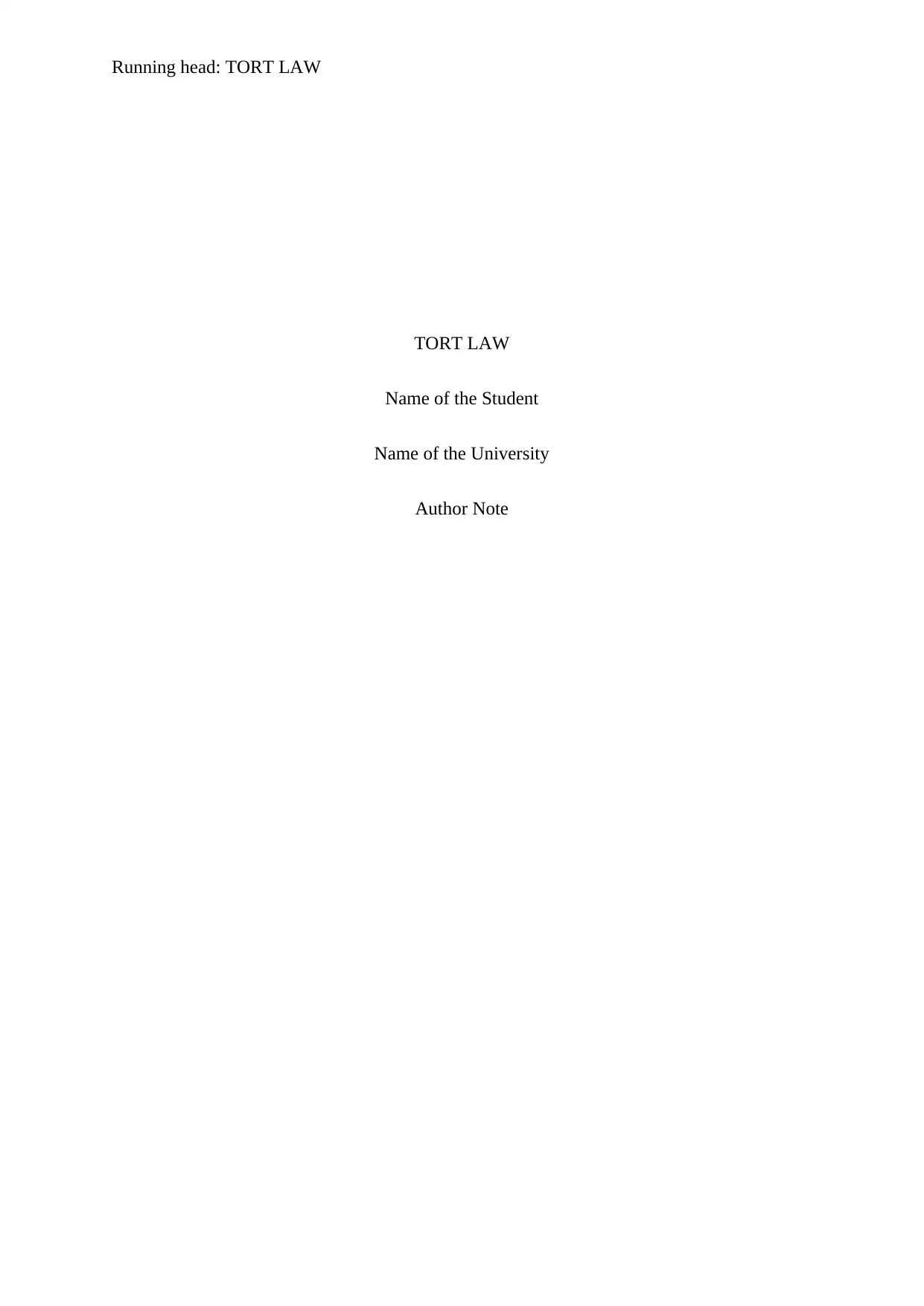
Running head: TORT LAW
TORT LAW
Name of the Student
Name of the University
Author Note
TORT LAW
Name of the Student
Name of the University
Author Note
Paraphrase This Document
Need a fresh take? Get an instant paraphrase of this document with our AI Paraphraser
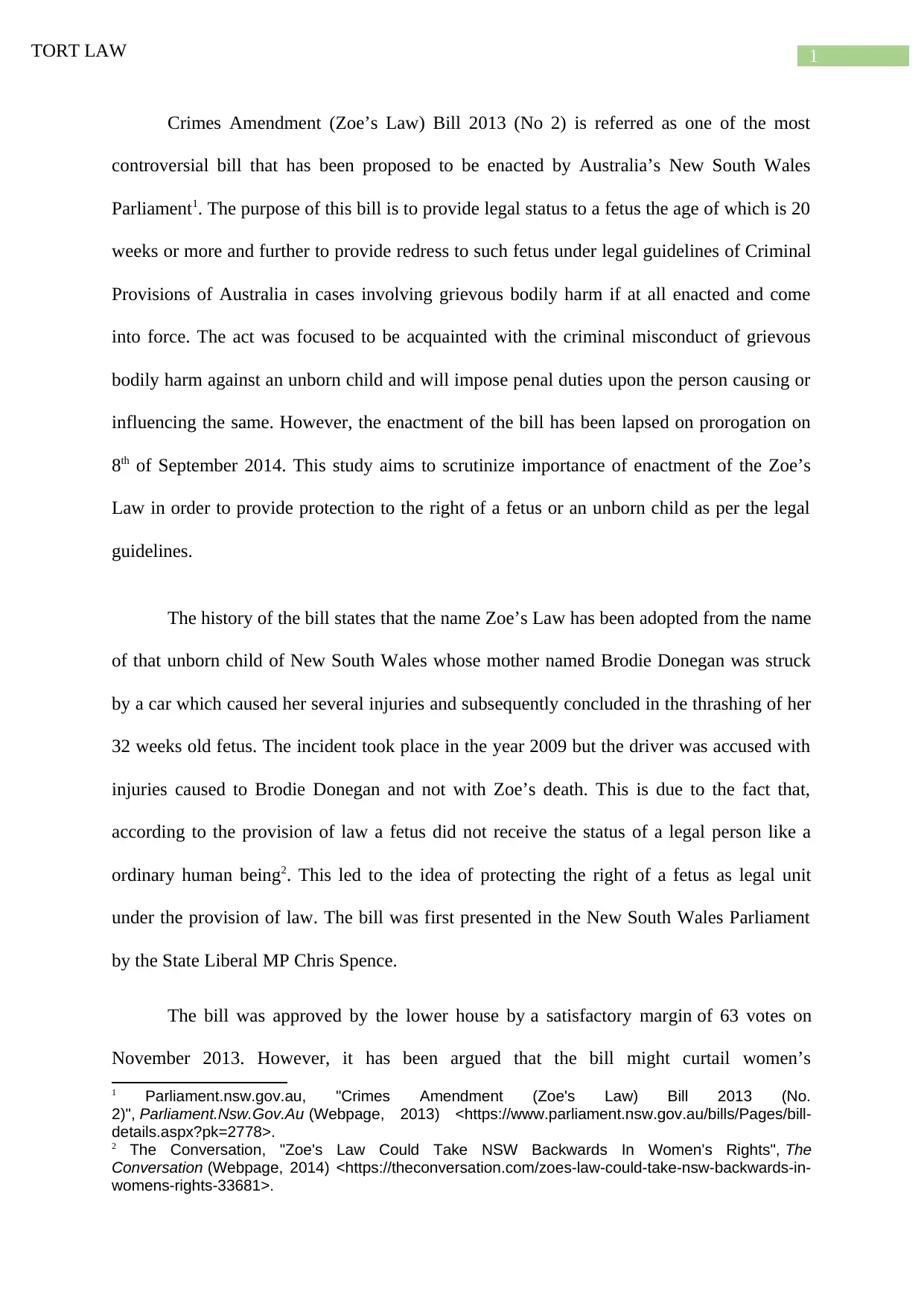
1TORT LAW
Crimes Amendment (Zoe’s Law) Bill 2013 (No 2) is referred as one of the most
controversial bill that has been proposed to be enacted by Australia’s New South Wales
Parliament1. The purpose of this bill is to provide legal status to a fetus the age of which is 20
weeks or more and further to provide redress to such fetus under legal guidelines of Criminal
Provisions of Australia in cases involving grievous bodily harm if at all enacted and come
into force. The act was focused to be acquainted with the criminal misconduct of grievous
bodily harm against an unborn child and will impose penal duties upon the person causing or
influencing the same. However, the enactment of the bill has been lapsed on prorogation on
8th of September 2014. This study aims to scrutinize importance of enactment of the Zoe’s
Law in order to provide protection to the right of a fetus or an unborn child as per the legal
guidelines.
The history of the bill states that the name Zoe’s Law has been adopted from the name
of that unborn child of New South Wales whose mother named Brodie Donegan was struck
by a car which caused her several injuries and subsequently concluded in the thrashing of her
32 weeks old fetus. The incident took place in the year 2009 but the driver was accused with
injuries caused to Brodie Donegan and not with Zoe’s death. This is due to the fact that,
according to the provision of law a fetus did not receive the status of a legal person like a
ordinary human being2. This led to the idea of protecting the right of a fetus as legal unit
under the provision of law. The bill was first presented in the New South Wales Parliament
by the State Liberal MP Chris Spence.
The bill was approved by the lower house by a satisfactory margin of 63 votes on
November 2013. However, it has been argued that the bill might curtail women’s
1 Parliament.nsw.gov.au, "Crimes Amendment (Zoe's Law) Bill 2013 (No.
2)", Parliament.Nsw.Gov.Au (Webpage, 2013) <https://www.parliament.nsw.gov.au/bills/Pages/bill-
details.aspx?pk=2778>.
2 The Conversation, "Zoe's Law Could Take NSW Backwards In Women's Rights", The
Conversation (Webpage, 2014) <https://theconversation.com/zoes-law-could-take-nsw-backwards-in-
womens-rights-33681>.
Crimes Amendment (Zoe’s Law) Bill 2013 (No 2) is referred as one of the most
controversial bill that has been proposed to be enacted by Australia’s New South Wales
Parliament1. The purpose of this bill is to provide legal status to a fetus the age of which is 20
weeks or more and further to provide redress to such fetus under legal guidelines of Criminal
Provisions of Australia in cases involving grievous bodily harm if at all enacted and come
into force. The act was focused to be acquainted with the criminal misconduct of grievous
bodily harm against an unborn child and will impose penal duties upon the person causing or
influencing the same. However, the enactment of the bill has been lapsed on prorogation on
8th of September 2014. This study aims to scrutinize importance of enactment of the Zoe’s
Law in order to provide protection to the right of a fetus or an unborn child as per the legal
guidelines.
The history of the bill states that the name Zoe’s Law has been adopted from the name
of that unborn child of New South Wales whose mother named Brodie Donegan was struck
by a car which caused her several injuries and subsequently concluded in the thrashing of her
32 weeks old fetus. The incident took place in the year 2009 but the driver was accused with
injuries caused to Brodie Donegan and not with Zoe’s death. This is due to the fact that,
according to the provision of law a fetus did not receive the status of a legal person like a
ordinary human being2. This led to the idea of protecting the right of a fetus as legal unit
under the provision of law. The bill was first presented in the New South Wales Parliament
by the State Liberal MP Chris Spence.
The bill was approved by the lower house by a satisfactory margin of 63 votes on
November 2013. However, it has been argued that the bill might curtail women’s
1 Parliament.nsw.gov.au, "Crimes Amendment (Zoe's Law) Bill 2013 (No.
2)", Parliament.Nsw.Gov.Au (Webpage, 2013) <https://www.parliament.nsw.gov.au/bills/Pages/bill-
details.aspx?pk=2778>.
2 The Conversation, "Zoe's Law Could Take NSW Backwards In Women's Rights", The
Conversation (Webpage, 2014) <https://theconversation.com/zoes-law-could-take-nsw-backwards-in-
womens-rights-33681>.
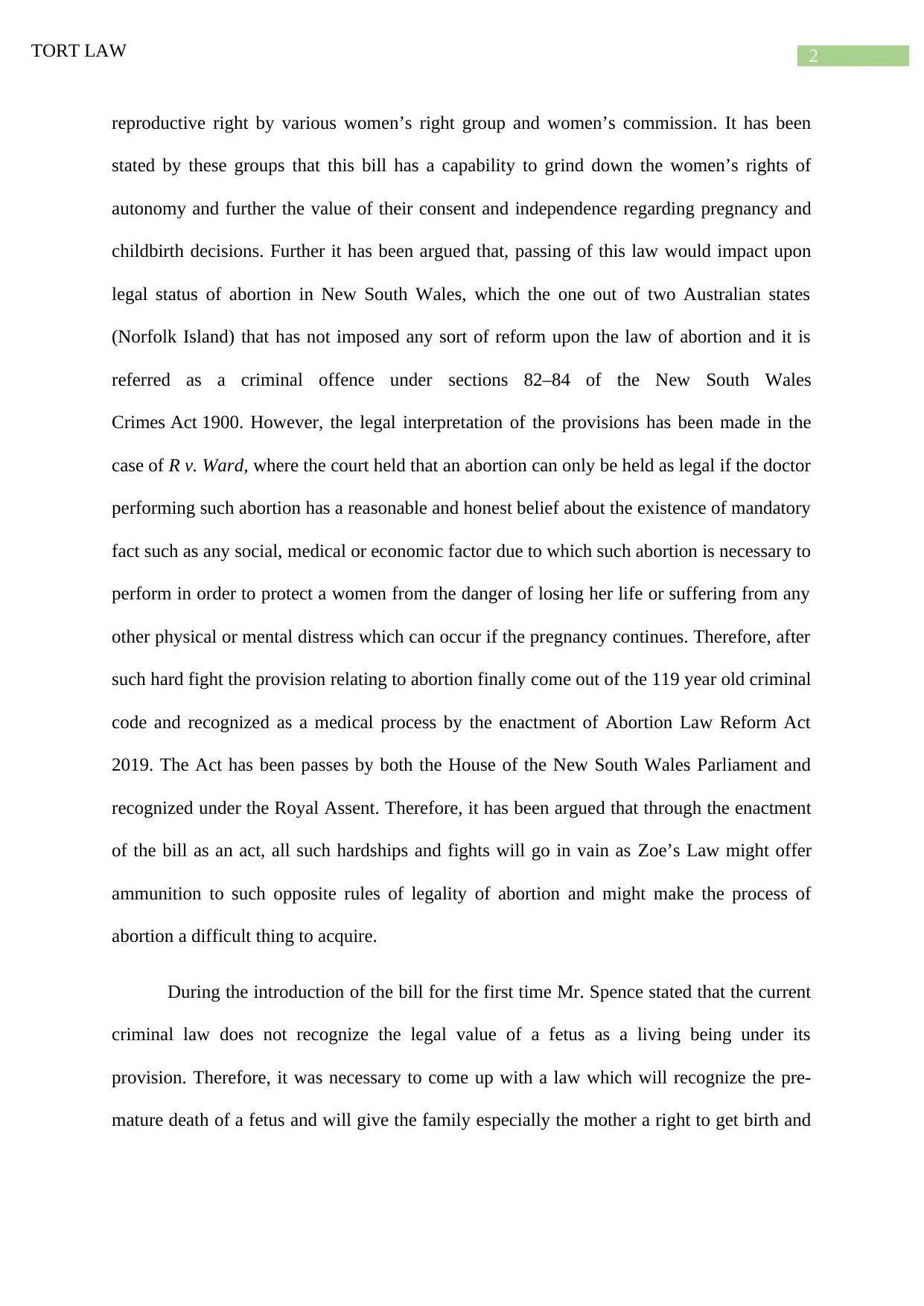
2TORT LAW
reproductive right by various women’s right group and women’s commission. It has been
stated by these groups that this bill has a capability to grind down the women’s rights of
autonomy and further the value of their consent and independence regarding pregnancy and
childbirth decisions. Further it has been argued that, passing of this law would impact upon
legal status of abortion in New South Wales, which the one out of two Australian states
(Norfolk Island) that has not imposed any sort of reform upon the law of abortion and it is
referred as a criminal offence under sections 82–84 of the New South Wales
Crimes Act 1900. However, the legal interpretation of the provisions has been made in the
case of R v. Ward, where the court held that an abortion can only be held as legal if the doctor
performing such abortion has a reasonable and honest belief about the existence of mandatory
fact such as any social, medical or economic factor due to which such abortion is necessary to
perform in order to protect a women from the danger of losing her life or suffering from any
other physical or mental distress which can occur if the pregnancy continues. Therefore, after
such hard fight the provision relating to abortion finally come out of the 119 year old criminal
code and recognized as a medical process by the enactment of Abortion Law Reform Act
2019. The Act has been passes by both the House of the New South Wales Parliament and
recognized under the Royal Assent. Therefore, it has been argued that through the enactment
of the bill as an act, all such hardships and fights will go in vain as Zoe’s Law might offer
ammunition to such opposite rules of legality of abortion and might make the process of
abortion a difficult thing to acquire.
During the introduction of the bill for the first time Mr. Spence stated that the current
criminal law does not recognize the legal value of a fetus as a living being under its
provision. Therefore, it was necessary to come up with a law which will recognize the pre-
mature death of a fetus and will give the family especially the mother a right to get birth and
reproductive right by various women’s right group and women’s commission. It has been
stated by these groups that this bill has a capability to grind down the women’s rights of
autonomy and further the value of their consent and independence regarding pregnancy and
childbirth decisions. Further it has been argued that, passing of this law would impact upon
legal status of abortion in New South Wales, which the one out of two Australian states
(Norfolk Island) that has not imposed any sort of reform upon the law of abortion and it is
referred as a criminal offence under sections 82–84 of the New South Wales
Crimes Act 1900. However, the legal interpretation of the provisions has been made in the
case of R v. Ward, where the court held that an abortion can only be held as legal if the doctor
performing such abortion has a reasonable and honest belief about the existence of mandatory
fact such as any social, medical or economic factor due to which such abortion is necessary to
perform in order to protect a women from the danger of losing her life or suffering from any
other physical or mental distress which can occur if the pregnancy continues. Therefore, after
such hard fight the provision relating to abortion finally come out of the 119 year old criminal
code and recognized as a medical process by the enactment of Abortion Law Reform Act
2019. The Act has been passes by both the House of the New South Wales Parliament and
recognized under the Royal Assent. Therefore, it has been argued that through the enactment
of the bill as an act, all such hardships and fights will go in vain as Zoe’s Law might offer
ammunition to such opposite rules of legality of abortion and might make the process of
abortion a difficult thing to acquire.
During the introduction of the bill for the first time Mr. Spence stated that the current
criminal law does not recognize the legal value of a fetus as a living being under its
provision. Therefore, it was necessary to come up with a law which will recognize the pre-
mature death of a fetus and will give the family especially the mother a right to get birth and
⊘ This is a preview!⊘
Do you want full access?
Subscribe today to unlock all pages.

Trusted by 1+ million students worldwide
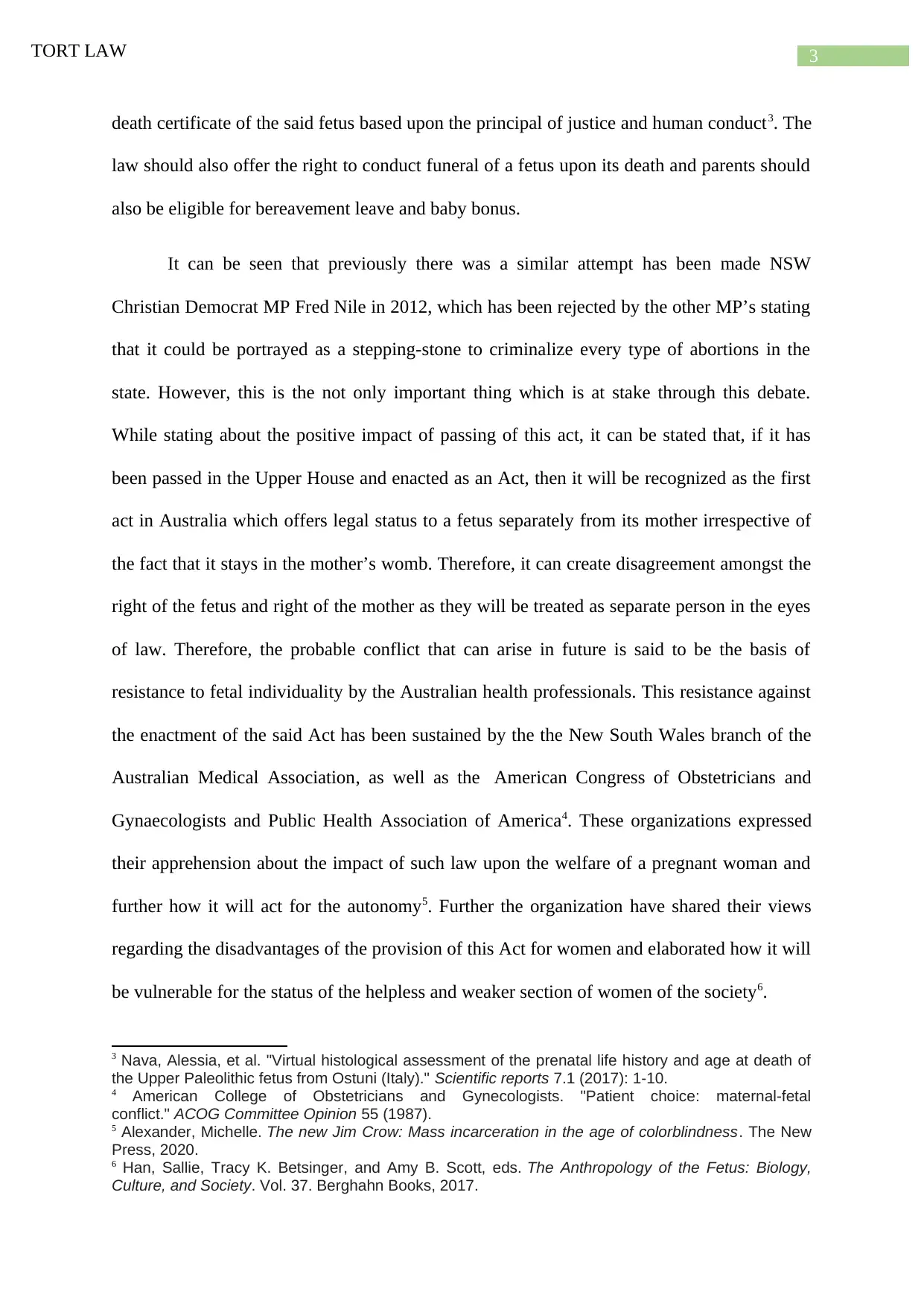
3TORT LAW
death certificate of the said fetus based upon the principal of justice and human conduct3. The
law should also offer the right to conduct funeral of a fetus upon its death and parents should
also be eligible for bereavement leave and baby bonus.
It can be seen that previously there was a similar attempt has been made NSW
Christian Democrat MP Fred Nile in 2012, which has been rejected by the other MP’s stating
that it could be portrayed as a stepping-stone to criminalize every type of abortions in the
state. However, this is the not only important thing which is at stake through this debate.
While stating about the positive impact of passing of this act, it can be stated that, if it has
been passed in the Upper House and enacted as an Act, then it will be recognized as the first
act in Australia which offers legal status to a fetus separately from its mother irrespective of
the fact that it stays in the mother’s womb. Therefore, it can create disagreement amongst the
right of the fetus and right of the mother as they will be treated as separate person in the eyes
of law. Therefore, the probable conflict that can arise in future is said to be the basis of
resistance to fetal individuality by the Australian health professionals. This resistance against
the enactment of the said Act has been sustained by the the New South Wales branch of the
Australian Medical Association, as well as the American Congress of Obstetricians and
Gynaecologists and Public Health Association of America4. These organizations expressed
their apprehension about the impact of such law upon the welfare of a pregnant woman and
further how it will act for the autonomy5. Further the organization have shared their views
regarding the disadvantages of the provision of this Act for women and elaborated how it will
be vulnerable for the status of the helpless and weaker section of women of the society6.
3 Nava, Alessia, et al. "Virtual histological assessment of the prenatal life history and age at death of
the Upper Paleolithic fetus from Ostuni (Italy)." Scientific reports 7.1 (2017): 1-10.
4 American College of Obstetricians and Gynecologists. "Patient choice: maternal-fetal
conflict." ACOG Committee Opinion 55 (1987).
5 Alexander, Michelle. The new Jim Crow: Mass incarceration in the age of colorblindness. The New
Press, 2020.
6 Han, Sallie, Tracy K. Betsinger, and Amy B. Scott, eds. The Anthropology of the Fetus: Biology,
Culture, and Society. Vol. 37. Berghahn Books, 2017.
death certificate of the said fetus based upon the principal of justice and human conduct3. The
law should also offer the right to conduct funeral of a fetus upon its death and parents should
also be eligible for bereavement leave and baby bonus.
It can be seen that previously there was a similar attempt has been made NSW
Christian Democrat MP Fred Nile in 2012, which has been rejected by the other MP’s stating
that it could be portrayed as a stepping-stone to criminalize every type of abortions in the
state. However, this is the not only important thing which is at stake through this debate.
While stating about the positive impact of passing of this act, it can be stated that, if it has
been passed in the Upper House and enacted as an Act, then it will be recognized as the first
act in Australia which offers legal status to a fetus separately from its mother irrespective of
the fact that it stays in the mother’s womb. Therefore, it can create disagreement amongst the
right of the fetus and right of the mother as they will be treated as separate person in the eyes
of law. Therefore, the probable conflict that can arise in future is said to be the basis of
resistance to fetal individuality by the Australian health professionals. This resistance against
the enactment of the said Act has been sustained by the the New South Wales branch of the
Australian Medical Association, as well as the American Congress of Obstetricians and
Gynaecologists and Public Health Association of America4. These organizations expressed
their apprehension about the impact of such law upon the welfare of a pregnant woman and
further how it will act for the autonomy5. Further the organization have shared their views
regarding the disadvantages of the provision of this Act for women and elaborated how it will
be vulnerable for the status of the helpless and weaker section of women of the society6.
3 Nava, Alessia, et al. "Virtual histological assessment of the prenatal life history and age at death of
the Upper Paleolithic fetus from Ostuni (Italy)." Scientific reports 7.1 (2017): 1-10.
4 American College of Obstetricians and Gynecologists. "Patient choice: maternal-fetal
conflict." ACOG Committee Opinion 55 (1987).
5 Alexander, Michelle. The new Jim Crow: Mass incarceration in the age of colorblindness. The New
Press, 2020.
6 Han, Sallie, Tracy K. Betsinger, and Amy B. Scott, eds. The Anthropology of the Fetus: Biology,
Culture, and Society. Vol. 37. Berghahn Books, 2017.
Paraphrase This Document
Need a fresh take? Get an instant paraphrase of this document with our AI Paraphraser
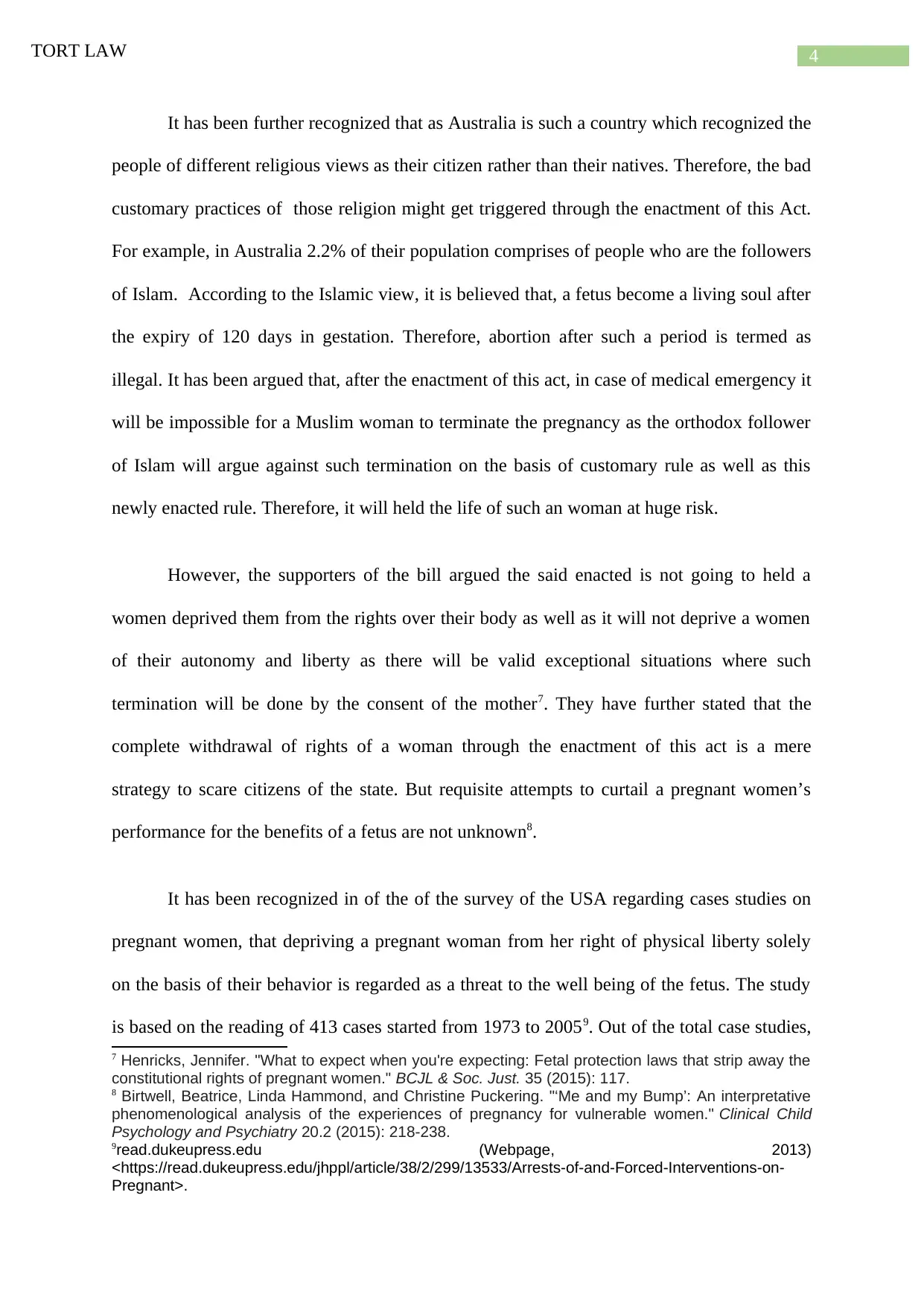
4TORT LAW
It has been further recognized that as Australia is such a country which recognized the
people of different religious views as their citizen rather than their natives. Therefore, the bad
customary practices of those religion might get triggered through the enactment of this Act.
For example, in Australia 2.2% of their population comprises of people who are the followers
of Islam. According to the Islamic view, it is believed that, a fetus become a living soul after
the expiry of 120 days in gestation. Therefore, abortion after such a period is termed as
illegal. It has been argued that, after the enactment of this act, in case of medical emergency it
will be impossible for a Muslim woman to terminate the pregnancy as the orthodox follower
of Islam will argue against such termination on the basis of customary rule as well as this
newly enacted rule. Therefore, it will held the life of such an woman at huge risk.
However, the supporters of the bill argued the said enacted is not going to held a
women deprived them from the rights over their body as well as it will not deprive a women
of their autonomy and liberty as there will be valid exceptional situations where such
termination will be done by the consent of the mother7. They have further stated that the
complete withdrawal of rights of a woman through the enactment of this act is a mere
strategy to scare citizens of the state. But requisite attempts to curtail a pregnant women’s
performance for the benefits of a fetus are not unknown8.
It has been recognized in of the of the survey of the USA regarding cases studies on
pregnant women, that depriving a pregnant woman from her right of physical liberty solely
on the basis of their behavior is regarded as a threat to the well being of the fetus. The study
is based on the reading of 413 cases started from 1973 to 20059. Out of the total case studies,
7 Henricks, Jennifer. "What to expect when you're expecting: Fetal protection laws that strip away the
constitutional rights of pregnant women." BCJL & Soc. Just. 35 (2015): 117.
8 Birtwell, Beatrice, Linda Hammond, and Christine Puckering. "‘Me and my Bump’: An interpretative
phenomenological analysis of the experiences of pregnancy for vulnerable women." Clinical Child
Psychology and Psychiatry 20.2 (2015): 218-238.
9read.dukeupress.edu (Webpage, 2013)
<https://read.dukeupress.edu/jhppl/article/38/2/299/13533/Arrests-of-and-Forced-Interventions-on-
Pregnant>.
It has been further recognized that as Australia is such a country which recognized the
people of different religious views as their citizen rather than their natives. Therefore, the bad
customary practices of those religion might get triggered through the enactment of this Act.
For example, in Australia 2.2% of their population comprises of people who are the followers
of Islam. According to the Islamic view, it is believed that, a fetus become a living soul after
the expiry of 120 days in gestation. Therefore, abortion after such a period is termed as
illegal. It has been argued that, after the enactment of this act, in case of medical emergency it
will be impossible for a Muslim woman to terminate the pregnancy as the orthodox follower
of Islam will argue against such termination on the basis of customary rule as well as this
newly enacted rule. Therefore, it will held the life of such an woman at huge risk.
However, the supporters of the bill argued the said enacted is not going to held a
women deprived them from the rights over their body as well as it will not deprive a women
of their autonomy and liberty as there will be valid exceptional situations where such
termination will be done by the consent of the mother7. They have further stated that the
complete withdrawal of rights of a woman through the enactment of this act is a mere
strategy to scare citizens of the state. But requisite attempts to curtail a pregnant women’s
performance for the benefits of a fetus are not unknown8.
It has been recognized in of the of the survey of the USA regarding cases studies on
pregnant women, that depriving a pregnant woman from her right of physical liberty solely
on the basis of their behavior is regarded as a threat to the well being of the fetus. The study
is based on the reading of 413 cases started from 1973 to 20059. Out of the total case studies,
7 Henricks, Jennifer. "What to expect when you're expecting: Fetal protection laws that strip away the
constitutional rights of pregnant women." BCJL & Soc. Just. 35 (2015): 117.
8 Birtwell, Beatrice, Linda Hammond, and Christine Puckering. "‘Me and my Bump’: An interpretative
phenomenological analysis of the experiences of pregnancy for vulnerable women." Clinical Child
Psychology and Psychiatry 20.2 (2015): 218-238.
9read.dukeupress.edu (Webpage, 2013)
<https://read.dukeupress.edu/jhppl/article/38/2/299/13533/Arrests-of-and-Forced-Interventions-on-
Pregnant>.
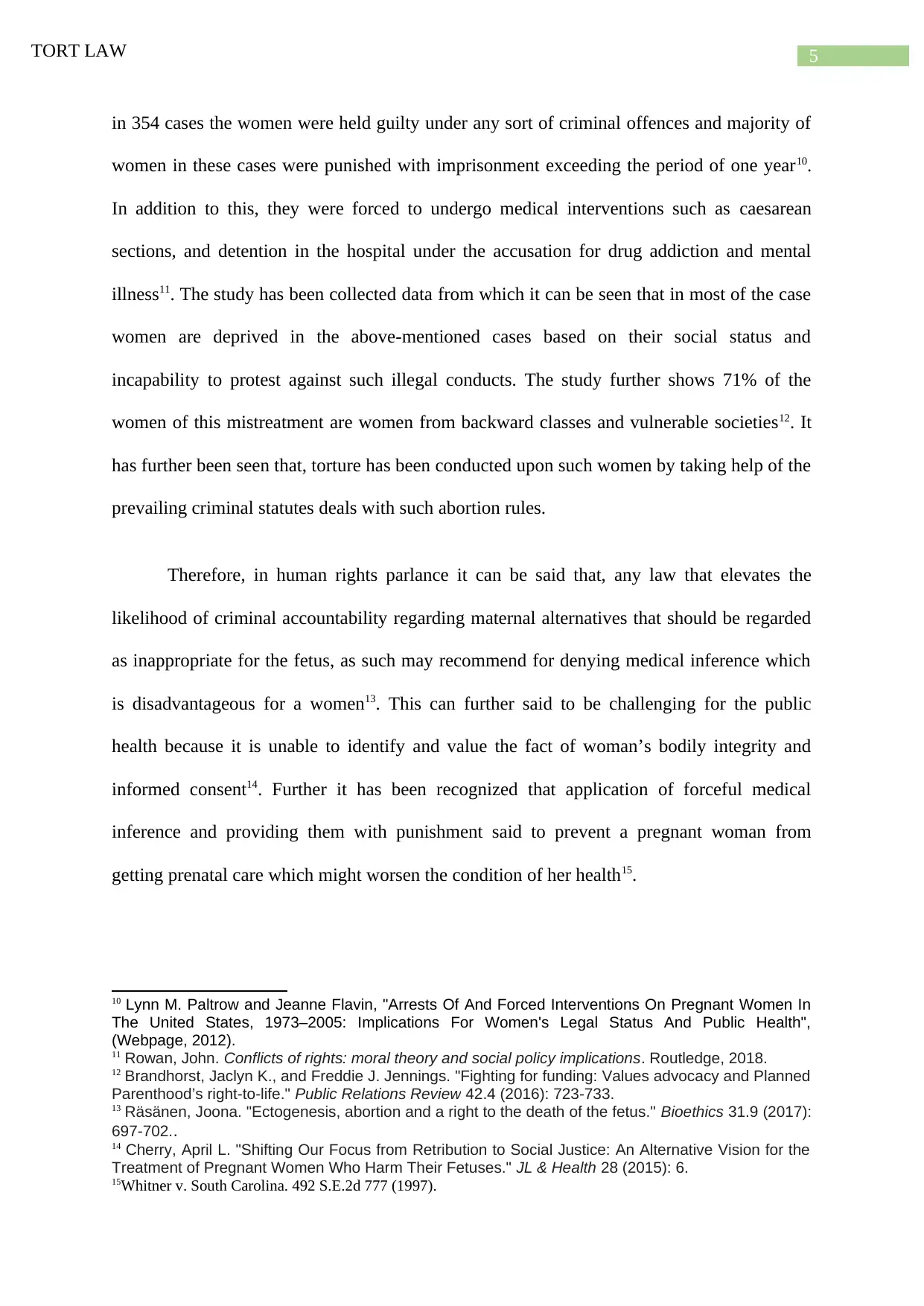
5TORT LAW
in 354 cases the women were held guilty under any sort of criminal offences and majority of
women in these cases were punished with imprisonment exceeding the period of one year10.
In addition to this, they were forced to undergo medical interventions such as caesarean
sections, and detention in the hospital under the accusation for drug addiction and mental
illness11. The study has been collected data from which it can be seen that in most of the case
women are deprived in the above-mentioned cases based on their social status and
incapability to protest against such illegal conducts. The study further shows 71% of the
women of this mistreatment are women from backward classes and vulnerable societies12. It
has further been seen that, torture has been conducted upon such women by taking help of the
prevailing criminal statutes deals with such abortion rules.
Therefore, in human rights parlance it can be said that, any law that elevates the
likelihood of criminal accountability regarding maternal alternatives that should be regarded
as inappropriate for the fetus, as such may recommend for denying medical inference which
is disadvantageous for a women13. This can further said to be challenging for the public
health because it is unable to identify and value the fact of woman’s bodily integrity and
informed consent14. Further it has been recognized that application of forceful medical
inference and providing them with punishment said to prevent a pregnant woman from
getting prenatal care which might worsen the condition of her health15.
10 Lynn M. Paltrow and Jeanne Flavin, "Arrests Of And Forced Interventions On Pregnant Women In
The United States, 1973–2005: Implications For Women's Legal Status And Public Health",
(Webpage, 2012).
11 Rowan, John. Conflicts of rights: moral theory and social policy implications. Routledge, 2018.
12 Brandhorst, Jaclyn K., and Freddie J. Jennings. "Fighting for funding: Values advocacy and Planned
Parenthood’s right-to-life." Public Relations Review 42.4 (2016): 723-733.
13 Räsänen, Joona. "Ectogenesis, abortion and a right to the death of the fetus." Bioethics 31.9 (2017):
697-702..
14 Cherry, April L. "Shifting Our Focus from Retribution to Social Justice: An Alternative Vision for the
Treatment of Pregnant Women Who Harm Their Fetuses." JL & Health 28 (2015): 6.
15Whitner v. South Carolina. 492 S.E.2d 777 (1997).
in 354 cases the women were held guilty under any sort of criminal offences and majority of
women in these cases were punished with imprisonment exceeding the period of one year10.
In addition to this, they were forced to undergo medical interventions such as caesarean
sections, and detention in the hospital under the accusation for drug addiction and mental
illness11. The study has been collected data from which it can be seen that in most of the case
women are deprived in the above-mentioned cases based on their social status and
incapability to protest against such illegal conducts. The study further shows 71% of the
women of this mistreatment are women from backward classes and vulnerable societies12. It
has further been seen that, torture has been conducted upon such women by taking help of the
prevailing criminal statutes deals with such abortion rules.
Therefore, in human rights parlance it can be said that, any law that elevates the
likelihood of criminal accountability regarding maternal alternatives that should be regarded
as inappropriate for the fetus, as such may recommend for denying medical inference which
is disadvantageous for a women13. This can further said to be challenging for the public
health because it is unable to identify and value the fact of woman’s bodily integrity and
informed consent14. Further it has been recognized that application of forceful medical
inference and providing them with punishment said to prevent a pregnant woman from
getting prenatal care which might worsen the condition of her health15.
10 Lynn M. Paltrow and Jeanne Flavin, "Arrests Of And Forced Interventions On Pregnant Women In
The United States, 1973–2005: Implications For Women's Legal Status And Public Health",
(Webpage, 2012).
11 Rowan, John. Conflicts of rights: moral theory and social policy implications. Routledge, 2018.
12 Brandhorst, Jaclyn K., and Freddie J. Jennings. "Fighting for funding: Values advocacy and Planned
Parenthood’s right-to-life." Public Relations Review 42.4 (2016): 723-733.
13 Räsänen, Joona. "Ectogenesis, abortion and a right to the death of the fetus." Bioethics 31.9 (2017):
697-702..
14 Cherry, April L. "Shifting Our Focus from Retribution to Social Justice: An Alternative Vision for the
Treatment of Pregnant Women Who Harm Their Fetuses." JL & Health 28 (2015): 6.
15Whitner v. South Carolina. 492 S.E.2d 777 (1997).
⊘ This is a preview!⊘
Do you want full access?
Subscribe today to unlock all pages.

Trusted by 1+ million students worldwide
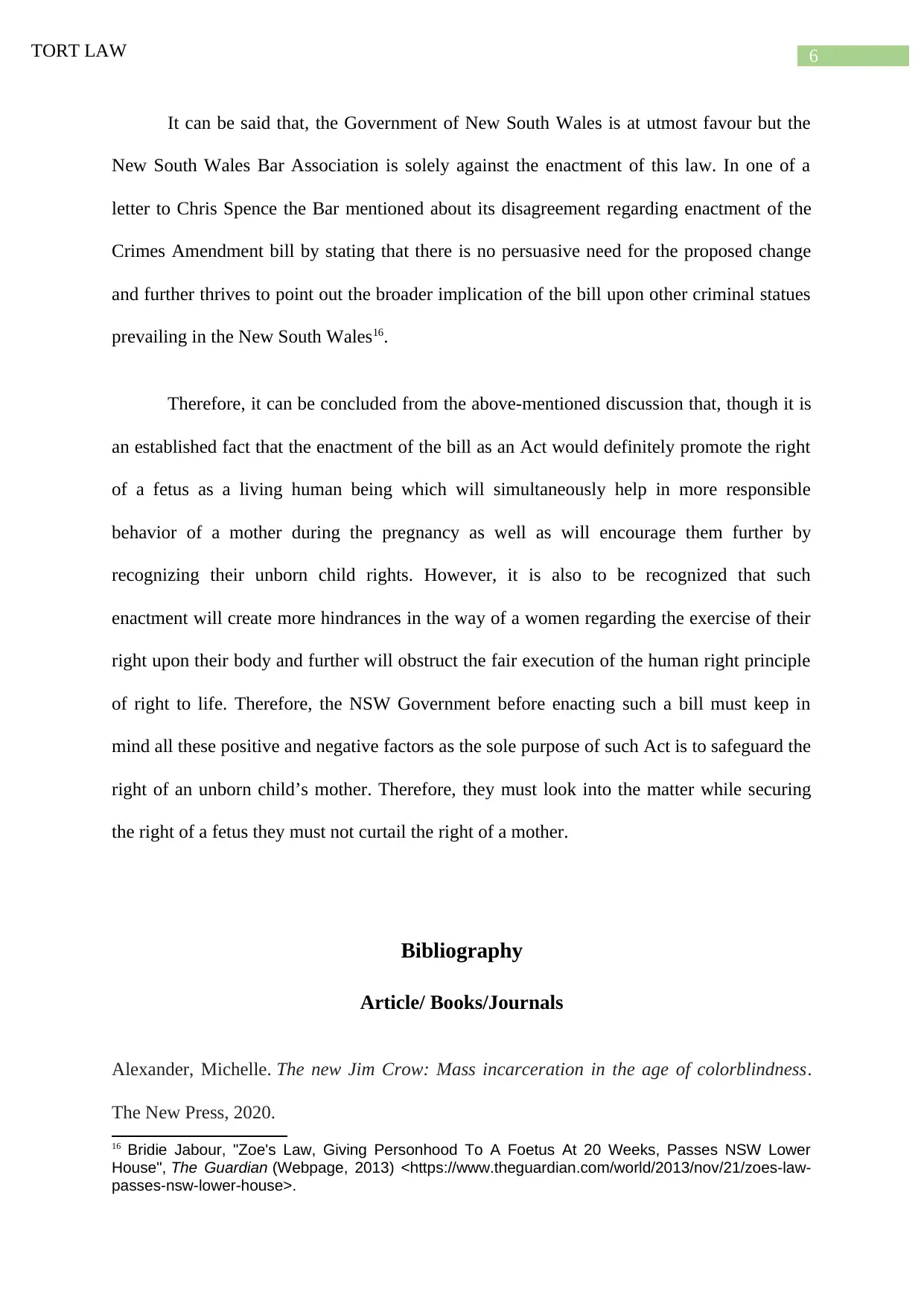
6TORT LAW
It can be said that, the Government of New South Wales is at utmost favour but the
New South Wales Bar Association is solely against the enactment of this law. In one of a
letter to Chris Spence the Bar mentioned about its disagreement regarding enactment of the
Crimes Amendment bill by stating that there is no persuasive need for the proposed change
and further thrives to point out the broader implication of the bill upon other criminal statues
prevailing in the New South Wales16.
Therefore, it can be concluded from the above-mentioned discussion that, though it is
an established fact that the enactment of the bill as an Act would definitely promote the right
of a fetus as a living human being which will simultaneously help in more responsible
behavior of a mother during the pregnancy as well as will encourage them further by
recognizing their unborn child rights. However, it is also to be recognized that such
enactment will create more hindrances in the way of a women regarding the exercise of their
right upon their body and further will obstruct the fair execution of the human right principle
of right to life. Therefore, the NSW Government before enacting such a bill must keep in
mind all these positive and negative factors as the sole purpose of such Act is to safeguard the
right of an unborn child’s mother. Therefore, they must look into the matter while securing
the right of a fetus they must not curtail the right of a mother.
Bibliography
Article/ Books/Journals
Alexander, Michelle. The new Jim Crow: Mass incarceration in the age of colorblindness.
The New Press, 2020.
16 Bridie Jabour, "Zoe's Law, Giving Personhood To A Foetus At 20 Weeks, Passes NSW Lower
House", The Guardian (Webpage, 2013) <https://www.theguardian.com/world/2013/nov/21/zoes-law-
passes-nsw-lower-house>.
It can be said that, the Government of New South Wales is at utmost favour but the
New South Wales Bar Association is solely against the enactment of this law. In one of a
letter to Chris Spence the Bar mentioned about its disagreement regarding enactment of the
Crimes Amendment bill by stating that there is no persuasive need for the proposed change
and further thrives to point out the broader implication of the bill upon other criminal statues
prevailing in the New South Wales16.
Therefore, it can be concluded from the above-mentioned discussion that, though it is
an established fact that the enactment of the bill as an Act would definitely promote the right
of a fetus as a living human being which will simultaneously help in more responsible
behavior of a mother during the pregnancy as well as will encourage them further by
recognizing their unborn child rights. However, it is also to be recognized that such
enactment will create more hindrances in the way of a women regarding the exercise of their
right upon their body and further will obstruct the fair execution of the human right principle
of right to life. Therefore, the NSW Government before enacting such a bill must keep in
mind all these positive and negative factors as the sole purpose of such Act is to safeguard the
right of an unborn child’s mother. Therefore, they must look into the matter while securing
the right of a fetus they must not curtail the right of a mother.
Bibliography
Article/ Books/Journals
Alexander, Michelle. The new Jim Crow: Mass incarceration in the age of colorblindness.
The New Press, 2020.
16 Bridie Jabour, "Zoe's Law, Giving Personhood To A Foetus At 20 Weeks, Passes NSW Lower
House", The Guardian (Webpage, 2013) <https://www.theguardian.com/world/2013/nov/21/zoes-law-
passes-nsw-lower-house>.
Paraphrase This Document
Need a fresh take? Get an instant paraphrase of this document with our AI Paraphraser
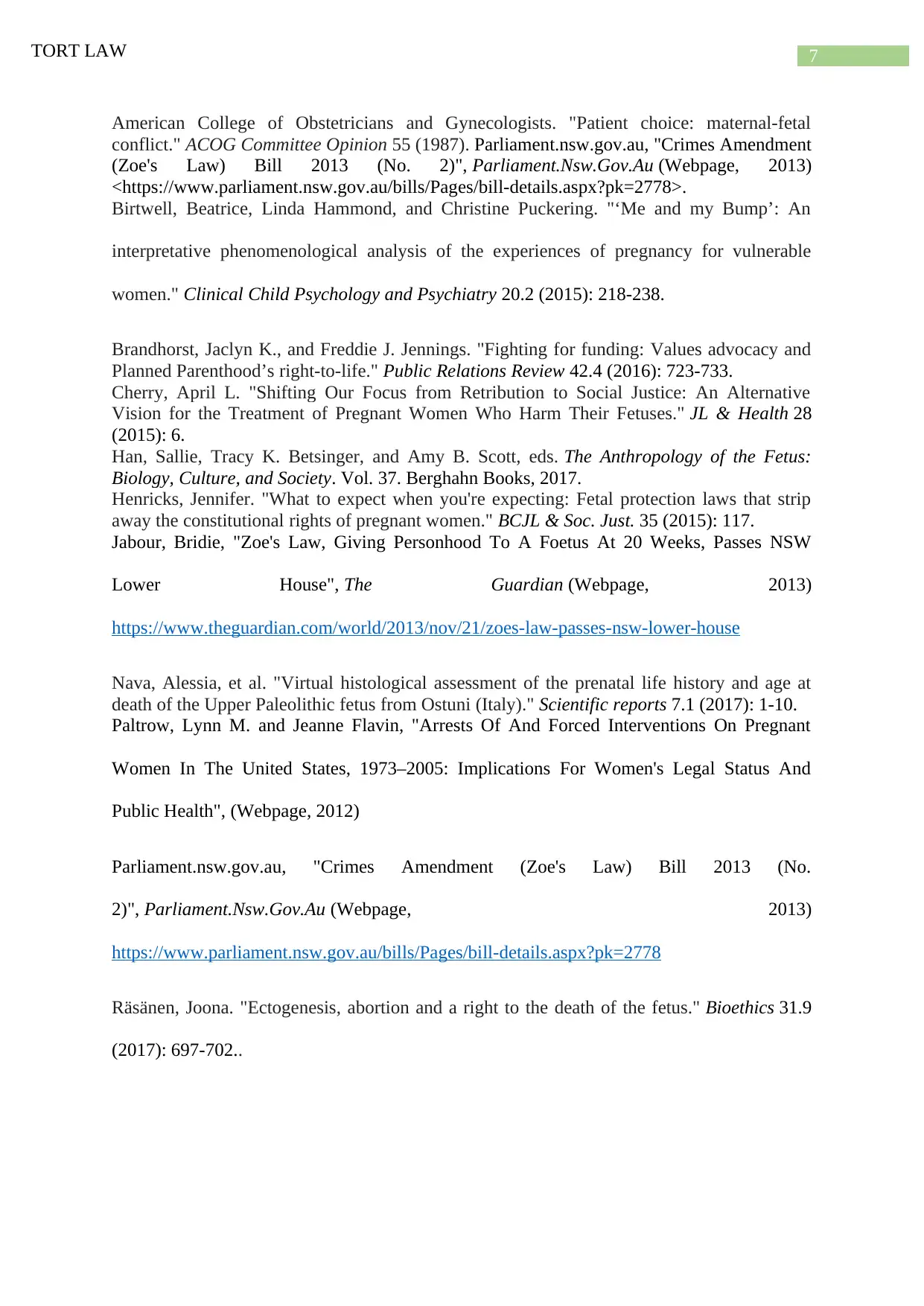
7TORT LAW
American College of Obstetricians and Gynecologists. "Patient choice: maternal-fetal
conflict." ACOG Committee Opinion 55 (1987). Parliament.nsw.gov.au, "Crimes Amendment
(Zoe's Law) Bill 2013 (No. 2)", Parliament.Nsw.Gov.Au (Webpage, 2013)
<https://www.parliament.nsw.gov.au/bills/Pages/bill-details.aspx?pk=2778>.
Birtwell, Beatrice, Linda Hammond, and Christine Puckering. "‘Me and my Bump’: An
interpretative phenomenological analysis of the experiences of pregnancy for vulnerable
women." Clinical Child Psychology and Psychiatry 20.2 (2015): 218-238.
Brandhorst, Jaclyn K., and Freddie J. Jennings. "Fighting for funding: Values advocacy and
Planned Parenthood’s right-to-life." Public Relations Review 42.4 (2016): 723-733.
Cherry, April L. "Shifting Our Focus from Retribution to Social Justice: An Alternative
Vision for the Treatment of Pregnant Women Who Harm Their Fetuses." JL & Health 28
(2015): 6.
Han, Sallie, Tracy K. Betsinger, and Amy B. Scott, eds. The Anthropology of the Fetus:
Biology, Culture, and Society. Vol. 37. Berghahn Books, 2017.
Henricks, Jennifer. "What to expect when you're expecting: Fetal protection laws that strip
away the constitutional rights of pregnant women." BCJL & Soc. Just. 35 (2015): 117.
Jabour, Bridie, "Zoe's Law, Giving Personhood To A Foetus At 20 Weeks, Passes NSW
Lower House", The Guardian (Webpage, 2013)
https://www.theguardian.com/world/2013/nov/21/zoes-law-passes-nsw-lower-house
Nava, Alessia, et al. "Virtual histological assessment of the prenatal life history and age at
death of the Upper Paleolithic fetus from Ostuni (Italy)." Scientific reports 7.1 (2017): 1-10.
Paltrow, Lynn M. and Jeanne Flavin, "Arrests Of And Forced Interventions On Pregnant
Women In The United States, 1973–2005: Implications For Women's Legal Status And
Public Health", (Webpage, 2012)
Parliament.nsw.gov.au, "Crimes Amendment (Zoe's Law) Bill 2013 (No.
2)", Parliament.Nsw.Gov.Au (Webpage, 2013)
https://www.parliament.nsw.gov.au/bills/Pages/bill-details.aspx?pk=2778
Räsänen, Joona. "Ectogenesis, abortion and a right to the death of the fetus." Bioethics 31.9
(2017): 697-702..
American College of Obstetricians and Gynecologists. "Patient choice: maternal-fetal
conflict." ACOG Committee Opinion 55 (1987). Parliament.nsw.gov.au, "Crimes Amendment
(Zoe's Law) Bill 2013 (No. 2)", Parliament.Nsw.Gov.Au (Webpage, 2013)
<https://www.parliament.nsw.gov.au/bills/Pages/bill-details.aspx?pk=2778>.
Birtwell, Beatrice, Linda Hammond, and Christine Puckering. "‘Me and my Bump’: An
interpretative phenomenological analysis of the experiences of pregnancy for vulnerable
women." Clinical Child Psychology and Psychiatry 20.2 (2015): 218-238.
Brandhorst, Jaclyn K., and Freddie J. Jennings. "Fighting for funding: Values advocacy and
Planned Parenthood’s right-to-life." Public Relations Review 42.4 (2016): 723-733.
Cherry, April L. "Shifting Our Focus from Retribution to Social Justice: An Alternative
Vision for the Treatment of Pregnant Women Who Harm Their Fetuses." JL & Health 28
(2015): 6.
Han, Sallie, Tracy K. Betsinger, and Amy B. Scott, eds. The Anthropology of the Fetus:
Biology, Culture, and Society. Vol. 37. Berghahn Books, 2017.
Henricks, Jennifer. "What to expect when you're expecting: Fetal protection laws that strip
away the constitutional rights of pregnant women." BCJL & Soc. Just. 35 (2015): 117.
Jabour, Bridie, "Zoe's Law, Giving Personhood To A Foetus At 20 Weeks, Passes NSW
Lower House", The Guardian (Webpage, 2013)
https://www.theguardian.com/world/2013/nov/21/zoes-law-passes-nsw-lower-house
Nava, Alessia, et al. "Virtual histological assessment of the prenatal life history and age at
death of the Upper Paleolithic fetus from Ostuni (Italy)." Scientific reports 7.1 (2017): 1-10.
Paltrow, Lynn M. and Jeanne Flavin, "Arrests Of And Forced Interventions On Pregnant
Women In The United States, 1973–2005: Implications For Women's Legal Status And
Public Health", (Webpage, 2012)
Parliament.nsw.gov.au, "Crimes Amendment (Zoe's Law) Bill 2013 (No.
2)", Parliament.Nsw.Gov.Au (Webpage, 2013)
https://www.parliament.nsw.gov.au/bills/Pages/bill-details.aspx?pk=2778
Räsänen, Joona. "Ectogenesis, abortion and a right to the death of the fetus." Bioethics 31.9
(2017): 697-702..
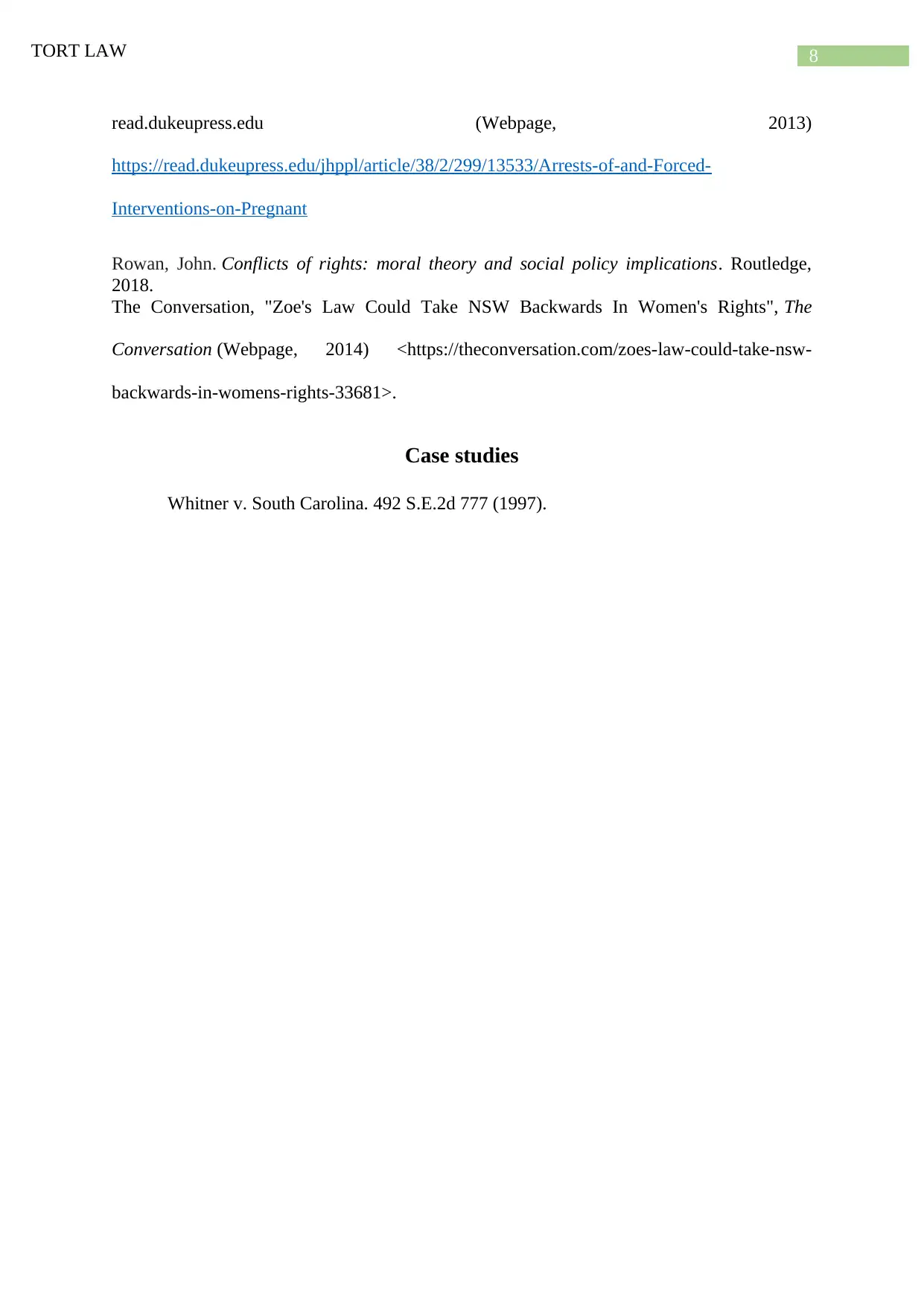
8TORT LAW
read.dukeupress.edu (Webpage, 2013)
https://read.dukeupress.edu/jhppl/article/38/2/299/13533/Arrests-of-and-Forced-
Interventions-on-Pregnant
Rowan, John. Conflicts of rights: moral theory and social policy implications. Routledge,
2018.
The Conversation, "Zoe's Law Could Take NSW Backwards In Women's Rights", The
Conversation (Webpage, 2014) <https://theconversation.com/zoes-law-could-take-nsw-
backwards-in-womens-rights-33681>.
Case studies
Whitner v. South Carolina. 492 S.E.2d 777 (1997).
read.dukeupress.edu (Webpage, 2013)
https://read.dukeupress.edu/jhppl/article/38/2/299/13533/Arrests-of-and-Forced-
Interventions-on-Pregnant
Rowan, John. Conflicts of rights: moral theory and social policy implications. Routledge,
2018.
The Conversation, "Zoe's Law Could Take NSW Backwards In Women's Rights", The
Conversation (Webpage, 2014) <https://theconversation.com/zoes-law-could-take-nsw-
backwards-in-womens-rights-33681>.
Case studies
Whitner v. South Carolina. 492 S.E.2d 777 (1997).
⊘ This is a preview!⊘
Do you want full access?
Subscribe today to unlock all pages.

Trusted by 1+ million students worldwide
1 out of 9
Your All-in-One AI-Powered Toolkit for Academic Success.
+13062052269
info@desklib.com
Available 24*7 on WhatsApp / Email
![[object Object]](/_next/static/media/star-bottom.7253800d.svg)
Unlock your academic potential
Copyright © 2020–2025 A2Z Services. All Rights Reserved. Developed and managed by ZUCOL.


